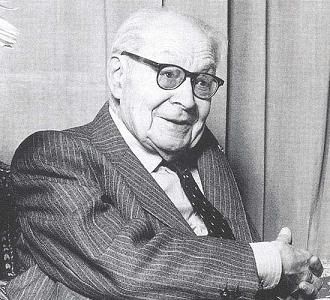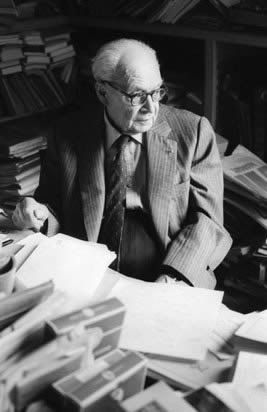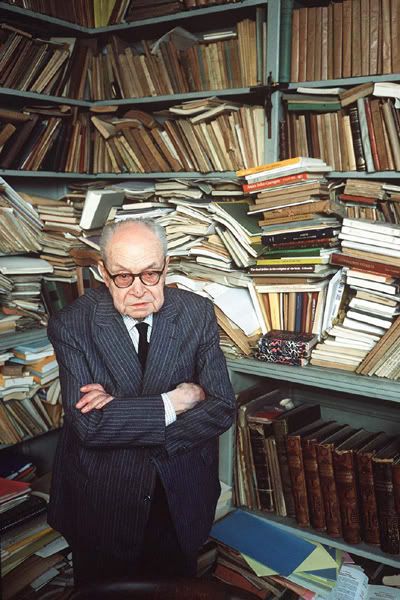The story of a great man
Once upon a time there was an old sage who lived in Paris in a house so full of books that he had barely space to move; and he had read them all. He had written more than sixty books and altogether invented his own discipline, and when he was admitted to the highest academic institution in France, he was described as a "more than encyclopedic master" who wrote in a style worthy of Voltaire; and all of that was true.



The name of the old sage was Georges Dumezil, and he had lived a long, long time. He had fought through the whole of the First World War, and he had lived in Turkey and in Sweden, rescued a lost language from oblivion, and eventually rediscovered a whole ancient culture to which many of the civilizations of past and present are the direct heirs. He had a tendency to stand alone, and had fought many battles; but just as many, over the years, were the friends, the admirers, and the followers he had drawn to his discipline and to himself. And this story will tell you why.
One day in the winter of 1982-83, Professor Dumezil received - care of the French Academy - a letter from an Italian conscript soldier in L'Aquila, which contained a modest suggestion about his comparative interpretation of Scandinavian mythology. This explanation connected the hitherto unexplained archer god Vali with the destroyer of the Fenris wolf, Vidharr, and made of the two a couple comparable with the Vedic couple of Vishnu and Indra. It was, compared with what the great man had achieved, a very small matter indeed - tidying up a corner of his cathedral of theories. But the great man was deeply happy, not just for the further insight, but - as he said - that someone out there was making use of his work to develop creative thought.
I was, as you will have guessed, that conscript, and the answer from the great man - to a letter sent in some anxiety and with little expectation - represents one of the two times in my life in which I was perfectly, shatteringly, overwhelmingly happy. It was not a long letter, but every word went home; are we not speaking, after all, of a master of French prose whose style has been compared to Voltaire's? And he asked me to set the idea into an article, which he would see published.
Well, my effort that followed was of the quality you can expect in someone who, at the time, had not yet seen the inside of a university; so the old gentleman rewrote it entirely - made it his own work, with plenty of insights I could never have reached - and sent it back to me, asking for my approval, still with my name on top of it. The last letter I sent him was a request for him to at least add his name to mine, because I did not want to take credit for what was ultimately his work.
A few months after this, he was dead. I did not hear of the article again, and I forgot about it; although the memory of the correspondence itself remained one of the golden points of my life. I remember that I told him about the Silver Angel mythology I was then developing, and he, who knew Homer and Virgil and the Mahabharata like the rest of us know the backs of our own hands, sent back a three-word comment: "Vous êtes poéte." This is the kind of thing that shines like a light across the rest of one's life.
Cut to a few days ago. I was doing something I rarely do, Googling my own name, mainly to see if anyone has been reading any of my stuff - research, blog, fanfics, whatever - and what they think of it. It is rare but very comforting to find that someone has been reading the History Of Britain 407-597, rarer still to find my other scholarly work referenced. Only this time I see something I had never come across before: my own name, in the footonotes of a learned article by Bernard Sergent - one of the scholars who have been influenced by Dumezil - credited with an article titled: "Le dieu scandinave Vali". It was, it seems, published in the final issue of a learned magazine called Ogam, assembled in 1893 but only published in 1989. The same issue also features an article with Dumezil's own by-line.
The old gentleman had done it. He did exactly what he had said - had the article published in my name, on a respected peer-reviewed forum, in the form he gave it. He couldn't know that I wouldn't know about if for decades (or for that matter still have trouble getting a copy, because the British Library doesn't have one). Do you realize how small this makes me feel? Not small in a negative sense, but humble, grateful, immensely admiring, and welling with thanks. Meeting with Dumezil, even at a distance, was the first of many lessons that confirmed the same story: that greatness goes with generosity and with humility, that the greater a man is, the more eager to give and to praise, that it is those who are at the top, not those who aren't, who are never tired of offering and admiring.



The name of the old sage was Georges Dumezil, and he had lived a long, long time. He had fought through the whole of the First World War, and he had lived in Turkey and in Sweden, rescued a lost language from oblivion, and eventually rediscovered a whole ancient culture to which many of the civilizations of past and present are the direct heirs. He had a tendency to stand alone, and had fought many battles; but just as many, over the years, were the friends, the admirers, and the followers he had drawn to his discipline and to himself. And this story will tell you why.
One day in the winter of 1982-83, Professor Dumezil received - care of the French Academy - a letter from an Italian conscript soldier in L'Aquila, which contained a modest suggestion about his comparative interpretation of Scandinavian mythology. This explanation connected the hitherto unexplained archer god Vali with the destroyer of the Fenris wolf, Vidharr, and made of the two a couple comparable with the Vedic couple of Vishnu and Indra. It was, compared with what the great man had achieved, a very small matter indeed - tidying up a corner of his cathedral of theories. But the great man was deeply happy, not just for the further insight, but - as he said - that someone out there was making use of his work to develop creative thought.
I was, as you will have guessed, that conscript, and the answer from the great man - to a letter sent in some anxiety and with little expectation - represents one of the two times in my life in which I was perfectly, shatteringly, overwhelmingly happy. It was not a long letter, but every word went home; are we not speaking, after all, of a master of French prose whose style has been compared to Voltaire's? And he asked me to set the idea into an article, which he would see published.
Well, my effort that followed was of the quality you can expect in someone who, at the time, had not yet seen the inside of a university; so the old gentleman rewrote it entirely - made it his own work, with plenty of insights I could never have reached - and sent it back to me, asking for my approval, still with my name on top of it. The last letter I sent him was a request for him to at least add his name to mine, because I did not want to take credit for what was ultimately his work.
A few months after this, he was dead. I did not hear of the article again, and I forgot about it; although the memory of the correspondence itself remained one of the golden points of my life. I remember that I told him about the Silver Angel mythology I was then developing, and he, who knew Homer and Virgil and the Mahabharata like the rest of us know the backs of our own hands, sent back a three-word comment: "Vous êtes poéte." This is the kind of thing that shines like a light across the rest of one's life.
Cut to a few days ago. I was doing something I rarely do, Googling my own name, mainly to see if anyone has been reading any of my stuff - research, blog, fanfics, whatever - and what they think of it. It is rare but very comforting to find that someone has been reading the History Of Britain 407-597, rarer still to find my other scholarly work referenced. Only this time I see something I had never come across before: my own name, in the footonotes of a learned article by Bernard Sergent - one of the scholars who have been influenced by Dumezil - credited with an article titled: "Le dieu scandinave Vali". It was, it seems, published in the final issue of a learned magazine called Ogam, assembled in 1893 but only published in 1989. The same issue also features an article with Dumezil's own by-line.
The old gentleman had done it. He did exactly what he had said - had the article published in my name, on a respected peer-reviewed forum, in the form he gave it. He couldn't know that I wouldn't know about if for decades (or for that matter still have trouble getting a copy, because the British Library doesn't have one). Do you realize how small this makes me feel? Not small in a negative sense, but humble, grateful, immensely admiring, and welling with thanks. Meeting with Dumezil, even at a distance, was the first of many lessons that confirmed the same story: that greatness goes with generosity and with humility, that the greater a man is, the more eager to give and to praise, that it is those who are at the top, not those who aren't, who are never tired of offering and admiring.